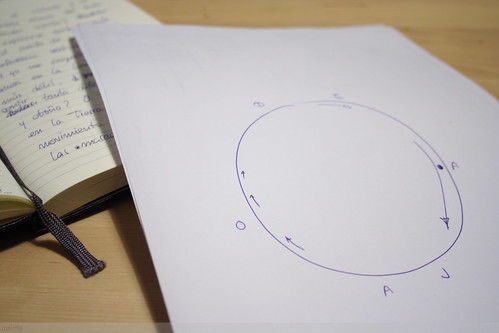Thanks to the internet, we can meet much more people today than we could if it would not exist. Meet them, take a brief look at their lives or follow their thoughts with interest. Anyway, for those who always felt a little geeky, those who wouldn't play football at school, those who rather kept quiet when the teacher asked something, for all of us, the internet makes us aware of our comforting averageness, after taking a look out there...
I've always liked to make up theories about why things are the way they are. Most of them are nothing but pure crap, but some of them, the oldest ones, achieved to me a status, maybe not of irrefutable truths, but at least theses for which a counter-example is yet to be found.
One of my favourites is the subjective perception of time, and how Newton mechanics comes in hand to explain it. Some time ago, it was remarked how spring and summer go away too fast. If we imagine the year as a circle, divided more or less uniformly in 12 sectors, corresponding to the 12 months, if we assume December and January at the top, we put it upright and we imagine time going by as a little ball rolling on it under gravity's action, it is then easy to understand why spring goes away so fast (the ball falls almost free from April on), why does summer, too (with all the drive from spring, September is already there before we can realise it), why is it so hard to pass from October to January (going uphill!), and why we start feeling more perked up from March on (gravity starts to pull us down).
Other time intervals can be explained with this approach as well: working hours (uphill from 8:00 to 12:00, downhill from 13:00 to 17:00, although sometimes the whole thing turns upside down, I don't really know why...) or the week (Saturday and Sunday at the bottom, Wednesday on top).
And I wonder, if we were on the Moon, where gravity is weaker, would we feel less difference between spring and autumn? Or, if we stayed on Earth, is the ball's movement affected by tides?
Sunday, 15 June 2008
About gravity and time perception
Labels:
I've got a theory,
internet,
thoughts
Subscribe to:
Post Comments (Atom)

 versión en español
versión en español







No comments:
Post a Comment